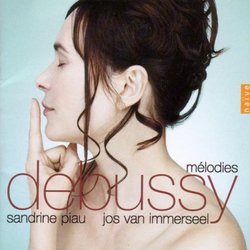Piau, Debussy and an Érard Piano Make for a Transcendent Com
Ed Uyeshima | San Francisco, CA USA | 07/05/2005
(5 out of 5 stars)
"Soprano Sandrine Piau impressed me considerably with her period-authentic performance on her recent 2005 recording, "Handel Opera Seria", as she provides expressive vocalism, a wide-ranging coloratura and an immaculate technique. This 2003 release applies her talent to the demanding art of French song, which has been well trodden of late with superbly rendered releases from the likes of mezzo-soprano Susan Graham, lyric tenor Rolando Villazón and countertenor David Daniels. Piau has the advantage of singing in her native tongue, and she is matched admirably by accompanist Jos van Immerseel, who plays on an 1897 Érard grand piano to uphold the integrity of Debussy's original compositions. The combination of the piano's precise and subtle sound and Piau's clear diction and phrasing makes Debussy's music transcendent.
The program is organized chronologically with two song cycles from Debussy's later years, the "Ariettes oubliées" and the "Proses lyriques", sandwiched between songs from Debussy's youth ("Mélodies de jeunesse") and his final cycle based on texts by Stéphane Mallarmé. It's obvious from the opening song, "Apparition", that Piau loves this music, as she milks the intensely expressive line with vigor and lets her supple voice soar with ease. In "C'est l'extase", the first song of the "Ariettes oubliées", she gently brings out each syllable's meaning indicating a gradual maturity in approach that is quite moving. But unlike Graham's consistently sonorous set, Piau lets loose with exuberant abandon on "Paysages belges: Chevaux de bois" when she enthusiastically describes the unfettered excitement of a carousel from a child's perspective. The last cycle is perhaps Piau's most accomplished, as she lends symmetry to the three songs from the sunrise described in the opening "Soupir" matches her glowing tone in the last song, "Évantail". Piau sings with astonishing precision and clarity of tone throughout no matter what the dramatic setting, whether she is being mournful or girlish. With the deeper tessitura of each succeeding cycle, Piau's voice deepens, and her interpretations take on a burnished quality. It is thrilling to hear such an ideal match between composer, voice and instrument."
Sterling recital
L. Gallagher | Los Angeles, CA United States | 10/11/2003
(5 out of 5 stars)
"Piau already belongs to the rarefied cadre of superlative French singers of baroque music -- Veronique Gens and Patricia Petibon are in the same league -- and here, like Gens and Petibon, Piau ventures into the modern field. This recital is even better than Piau's recent Mozart album. The rapport between singer and pianist is uncanny, and Piau's singing is unfailingly responsive to the texts, and supremely beautiful. A gorgeous album."
Even Better Than I Hoped!
Giordano Bruno | Wherever I am, I am. | 05/05/2009
(5 out of 5 stars)
"Sandrine Piau brings all her superb 'early music' vocal technique - agility, clarity, delicacy, and perfect tuning - to the realization of these melodious art songs by Claude Debussy (1862-1918). And what she doesn't bring to this performance is just as important: no wobble, no non-ornamental vibrato; no bellow, no swelling or swooping. I bought this album simply on the credibility of Piau's Baroque performances, not because I'm a dyed-in-the-velvet Debussy fan, but what a revelation! Hearing Piau sing these songs is like eating sushi for the first time after a diet of fish sticks.
The texts of these "mélodies" are poems by some of the greatest French poets - Verlaine and Mallarmé especially - and it's an added thrill to be able to distinguish one word from another, something only possible with the kind of 'historically informed' attention to diction that typifies singers like Piau.
The sensitive interaction between singer and pianist is what elevates these compositions from mere recital pieces to great music. Pianist Jos van Immerseel drapes his filagreed piano passages around Piau's voice like a silken ball gown. The piano he plays is a historical instrument, an Erard built in 1897. In the notes, Immerseel explains the differences in the action, escarpment, and pedals. What I can hear on the CD is the greater 'specificity' and transparency of overtones, a result of the strings being all parallel rather than overlapping and rumbling sympathetically in the manner of the more recent grand pianos. Immerseel states that the French of Debussy's era highly valued "jeu perlé" - tonal precision - and to my ears, there was good 'raison.'
Baroque-niks! Time to vary your collections! Let's declare this CD Giordano's "must buy" for May 2009!"


 Track Listings (18) - Disc #1
Track Listings (18) - Disc #1